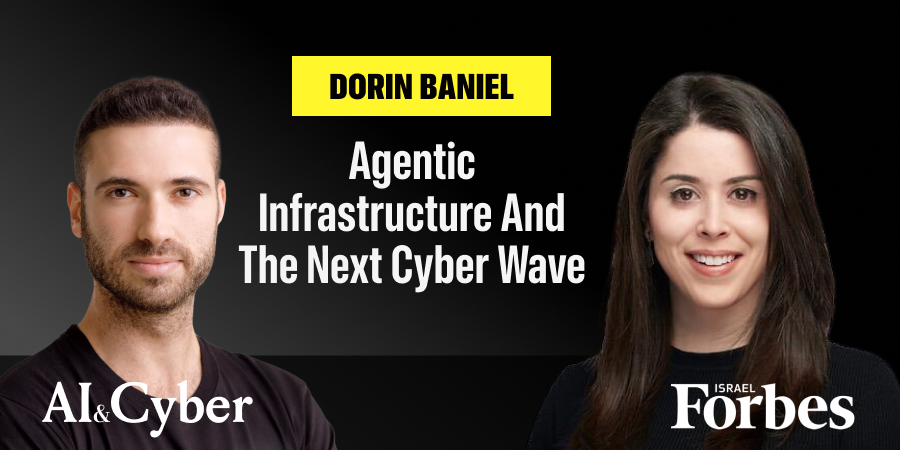Dorin Baniel doesn’t just invest in cybersecurity—she lives in the future of it. From her early days helping scale Glilot Capital’s influence in the cyber ecosystem to her current role at NightDragon, she’s been at the frontlines of the industry’s evolution. When we sat down, just a day after NightDragon publicly announced its investment in Classiq, Dorin brought both clarity and urgency to the agentic shift now reshaping cybersecurity.
“Just like 2018 was about cloud-first,” she told me, “2025 is about agentic-first.” The same way cloud redefined infrastructure and risk surfaces, AI agents are now multiplying across the enterprise—introducing a new wave of complexity, opportunity, and risk. Dorin predicts that every cybersecurity category will eventually be rewritten with this lens: agentic pen testing, agentic SOC, agentic identity, and more. It’s not theory. At RSA this year, agentic infrastructure was the most common thread in every CISO conversation she had.
Dorin’s path into cyber wasn’t traditional. Born in Israel, raised in the Chicago suburbs, she started her career in enterprise marketing and corporate development. She joined Microsoft for Startups at a time when few people in the U.S. venture world were paying attention to early-stage Israeli cyber. It was there she got her first exposure to now-unicorns like BigID and Panorays, then just two-person ideas. But the real inflection point came when she joined Glilot in 2018. At the time, Glilot wasn’t yet branded as a cyber-first fund—and the Israeli cyber VC scene was still in its adolescence.
Dorin helped shape that scene. She cold-emailed dozens of CISOs a day to build Glilot’s advisory board, set up one of the first dedicated value creation teams in the space, and helped founders go from MVP to exit in record time. Her background in psychology, computer science, and business came together in a rare combination: she could decode tech, sell the vision, and build trust.
But five years in, she realized something was missing. “I wanted to understand how American firms make decisions,” she said. “Because if Israeli founders want to go big, they need U.S. capital—and distribution.” That realization led her to NightDragon. She cold-pitched the idea of establishing the firm’s Israeli presence—complete with a deck, a strategy, and a vision—and within a few hours of her meeting with CEO Dave DeWalt, she had a mandate to build it.
Today, Dorin is tracking the rise of agentic computing not just as a trend, but as a paradigm shift. In a world where every person can build their own micro-application, security tools built for the enterprise won’t scale. We’re entering a world where millions of AI agents interact, execute tasks, and touch sensitive data—all without a CISO in sight. “It’s like what happened with SMBs,” she said. “Now, it’s everyone. Everyone’s a builder.”
That changes the AppSec model entirely. Visibility becomes priority #1. “CISOs don’t yet know what to buy. They just want to know what’s going on,” Dorin said. The flood of new startups is exciting—but purchasing is lagging. CISOs are in an experimental mindset. The market is still validating which problems are real, which solutions are mature, and which categories even exist. But one M&A event—like Protect AI’s recent acquisition—can trigger a wave of urgency and buying behavior.
For founders, that means navigating a minefield. With foundation models commoditizing once-proprietary tech overnight, startups need to rethink what differentiation means. “Tech is no longer the only moat,” Dorin noted. “Go-to-market is what scales you from $10M to $100M.” It’s a lesson echoed by NightDragon’s DNA: Dave DeWalt’s playbook of billion-dollar exits is grounded in global partnerships, channel access, and value creation at scale.
And it’s why NightDragon now boasts more than 120 signed partnerships across enterprise and federal markets—unlocked for their portfolio companies from day one. “We’re driving tens of millions in ARR just by plugging in the right partners,” she said. That kind of distribution is the new multiplier.
Dorin believes the Israeli ecosystem is at a crossroads. Our technical edge is still sharp—but the rules of scale are changing. Founders who master both sides—product and distribution—will build enduring companies. Others may exit early, not out of weakness, but because they missed the go-to-market inflection point.
And what’s next? Dorin’s already looking ahead: quantum. “Quantum advantage is coming,” she said. “By 2030, it’s going to change everything.” That’s why agility—not just intelligence—is the currency of this new cyber era.
Michael Matias is the CEO and Co-Founder of Clarity, an AI-powered cybersecurity startup backed by Bessemer Venture Partners and Walden Catalyst. Clarity develops advanced AI technologies protecting organizations from phishing, deepfakes, and AI-generated social engineering attacks. Michael studied Computer Science with a specialization in AI at Stanford University, led cyber teams in Unit 8200, was named to Forbes 18Under18 and 30Under30, authored the book Age is Only an Int, and hosts the podcast 20MinuteLeaders.





